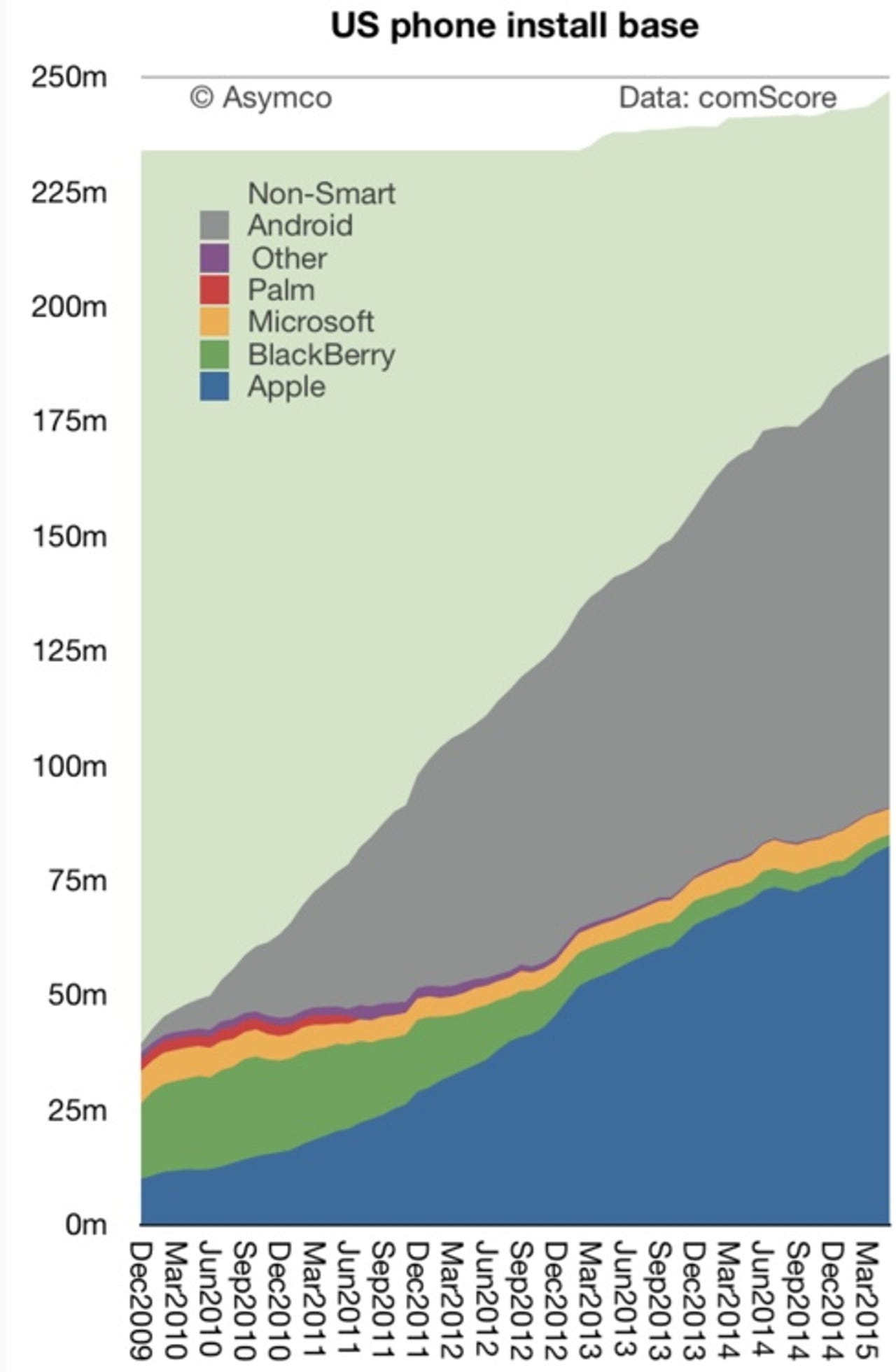What's next for Windows Phone?

It's less than 24 hours since Microsoft announced a $7.6 billion write-down on its acquisition of Nokia and aggressive layoffs, and the tech press has been quick in penning the Windows Phone obituaries.
- Windows Phone was great, but here's why it deserved to die
- With Microsoft Layoffs, Windows Phone's Prospects Dim Further
- Cutting Jobs, Microsoft Turns Page on Nokia Deal
- Microsoft Doesn't Want to Make Smartphones Anymore
Even long-time supporters of the platform, such as ZDNet's own Matthew Miller, have come to the conclusion that the end is nigh for Windows Phone.
"After five years of championing Windows Phone," wrote Miller, "the news today has me finally deciding to leave Windows Phone behind."
The problem that Microsoft is facing with Windows Phone is that after many years and billions of dollars spent, the user base hasn't grown significantly since 2010. Here's one chart by Asymco analyst Horace Dedui that clearly shows the cause of death: crushed between the two juggernauts of iOS and Android.

Now I'm pretty sure that there will be no end of finger pointing and blaming over the next few days. And that's easy to do, given how many fumbles Microsoft has made when it comes to mobile. Microsoft was insouciant to the risks. One fumble is bad enough in such an aggressive market, but a whole series of fumbles pretty much guarantees billions of dollars lost and thousands of painful job cuts.
And suffice to say that this is a mess that Nadella inherited, and one he's dealing with in pretty much the only way he can.
But there's also a lesson for the future, and that is that given the speed with which new markets hit maturity, you're either first, second, or dead. Microsoft's mobile aspirations have always been a third wheel, first crushed between iOS and BlackBerry, and now iOS and Android.
So what's next for Windows Phone?
Nadella's email to the troops breaking the bad news gives us some pointers:
"We plan to narrow our focus to three customer segments where we can make unique contributions and where we can differentiate through the combination of our hardware and software. We'll bring business customers the best management, security and productivity experiences they need; value phone buyers the communications services they want; and Windows fans the flagship devices they'll love."
Here he outlines three categories: business, value phone buyers, and Windows fans. But I don't think Nadella is talking about making phones for each of these categories. Instead, reading between the lines, what I believe he means is that Microsoft is going to focus on software for business (Word, Excel, that stuff) for iOS and Android, pushing Skype onto value phones, and throwing the odd bone in the direction of hardcore fans with a "flagship" device every now and then.
But "flagship devices" surely mean more Windows Phone smartphones, right? Maybe not. It could equally mean more Surface devices (perhaps a phablet), or stuff like HoloLens (which could be another cash bonfire for Microsoft if it's not careful).
AR + VR
The fact that Nadella chose the word "devices" as opposed to "smartphones" suggests to me that Windows Phone is on the way out, and that Microsoft could be getting ready to exit the market in the next few years. Devices that are currently in the pipeline will be brought to market, at which the fans will say "see, Microsoft isn't ditching smartphones," and then a year or two down the line, we'll notice that there are no new Windows Phone devices coming out, and that will close the Windows Phone chapter with the least fuss possible.
And that's a real shame, because Windows 10 is Microsoft's best mobile platform. But burning massive piles of R&D cash on making handsets for a user base of a few million doesn't make sense.
It makes sense for Microsoft to focus on apps such as Office and Skype for Android and iOS, but what about the popular idea that Microsoft should somehow try to shoehorn Android apps onto Windows Phone, or even embrace the Android OS in favour of its offering? That still leaves Microsoft as a small player, only now scrabbling for market share against the likes of Samsung and LG.
That doesn't make sense.
Bottom line, I think that this is the end of the line for Windows Phone. I've no doubt that we'll see some new handsets, and there will be a small injection of interest with Windows 10, but none of that will change the underlying problem facing the platform, which quite simply is a severe lack of people willing to exchange legal tender for Windows Phone devices.
Without a buoyant user base, developers just aren't interested in investing time and resources in the Windows Phone platform. And why should they -- when Microsoft itself seems to have lost interest developing for the platform.
See also:
- Apple Watch sales may have fallen by 90 percent since launch
- Why Samsung Galaxy S6 sales suck
- Why Microsoft buying AMD would be a bad idea
- The seven "Prime Directives" of repairing and upgrading tech
- Windows 10: The only major OS still trying to squeeze a buck from consumers
- Desert island tech: What you need when you're off the grid